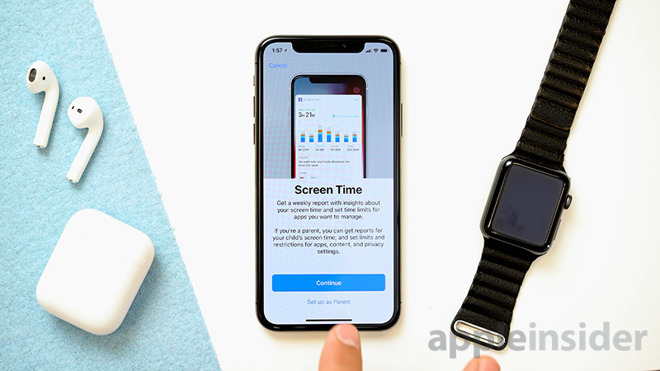Apple has eliminated 11 of the 17 most popular screen time monitoring and parental control apps from the App Store, and has done so with increasing frequency since it launched its own monitoring tool, Screen Time, in iOS 12.
Apple's withdrawals started arriving shortly after Screen Time arrived in iOS 12, and have progressed to more and more apps as the months have worn on. Reportedly, there has been an escalation since December, when the removals were first spotted.
"They yanked us out of the blue with no warning," Chief Executive of OurPact Amir Moussavian told the New York Times in a new report published on Saturday. "They are systematically killing the industry."
In many cases, the apps that had demands for feature removal were more full-featured than Apple's ScreenTime. Some third-party apps removed allowed for iPhone-owning parents to monitor Android devices. Others blocked in appropriate content on browsers other than Safari. Neither feature is available in Screen Time.
The move is explicitly authorized by the terms of conditions that all developers agree with, when they publish apps through the App Store. In speaking with Apple on Saturday morning, AppleInsider was told that the feature removal requests and app withdrawals fall under section 5.2.5 of the App Store app review guidelines, specifically saying "don't create an App that appears confusing similar to an existing Apple Product, interface, app, or advertising theme."
Developers have also been told that they were violating guideline 2.5.1 of the guidelines, which prohibits use of public APIs in an unapproved manner.
Some rejection letters seen by AppleInsider since the original December report inform developers that the apps, as submitted, potentially have too much access to a child's data, in possible violation of section 17.4 of the Children's Online Privacy Protection Act (COPPA), and the related section 1.3 of the App Store terms. However, many of the sections of COPPA cited by Apple's rejections can be bypassed by parental consent, which presumably the parents would grant, if they're installing some form of monitoring application on an iPhone.
"We treat all apps the same, including those that compete with our own services," Apple said, in a statement to AppleInsider and other venues. "Our incentive is to have a vibrant app ecosystem that provides consumers access to as many quality apps as possible."
In social media, the app removal report is bringing up the long-time neologism "Sherlocked" for when Apple replaces a third-party application's functionality with something baked into the operating system. Over 15 years ago with the release of MacOS X 10.2, Sherlock 3 was a substantively similar Apple-generated clone of Karelia Software's Watson. Ultimately, Sherlock 3 effectively killed Watson, spawning the "Sherlocked" term.
 Mike Wuerthele
Mike Wuerthele







-m.jpg)






 Charles Martin
Charles Martin
 Christine McKee
Christine McKee
 Wesley Hilliard
Wesley Hilliard
 Malcolm Owen
Malcolm Owen
 Andrew Orr
Andrew Orr
 William Gallagher
William Gallagher
 Sponsored Content
Sponsored Content







54 Comments
In the same story in the New York Times (https://www.nytimes.com/2019/04/27/technology/apple-screen-time-trackers.html?action=click&module=News&pgtype=Homepage) it is said that the European Union Regulators are looking into this. It also cites Senator Warren who proposed to separate the Appstore from Apple. Has Apple overplayed their hand?
Seems Apple has a death-wish.
If I was starting out as a new app developer, I think I would look to another platform than iOS today. This pains me to say since I have had several successful iOS apps including one of the original iPad launch apps. You just can't trust iOS as a platform because Apple can and will arbitrarily tell you that an important feature of your apps must be removed. They don't even follow their own guidelines. Has Google ever removed an app from the Google store because it is similar to one of their own apps or features? I can't think of a case (none have appeared in the news).
This reeks of anticompetitive behaviour. Apple is already walking a fine line with the App Store and with Steam Link. The app store being the only choice isn't necessarily as anticompetitive IMO, as you can sideload apps, in theory, or switch to Android. The App Store is monopolistic on iOS, but not in the marketplace as a whole. But both Apple's refusal to allow Steam Link as someone might buy something through it bypassing Apple's 30% cut is definitely anticompetitive, as is this; literally removing apps that compete with Apple's own features. What'll be next, Messenger, Viber, Signal, Telegram as they compete with iMessage? What makes it even more ridiculous is Apple's not missing out on anything by removing these screen time apps, just making their customers suffer and regulators come knocking.
Pointing to Apple's guidelines that state that developers may not have apps with similar features to those in iOS is of little consequence from an anticompetitive point of view. If the guidelines result in anticompetitive behaviour from Apple, a regulator will force Apple to change them. I hate to say it but I think the regulators to need to have words with Apple to put them back in their place a bit.
Apple not allowing anything on iPhones that doesn’t make them money. Who would have thought.